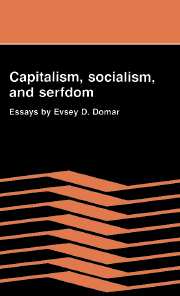Book contents
- Frontmatter
- Contents
- List of tables and figures
- Foreword
- Acknowledgments
- Part I Economic systems
- 1 Reflections on economic development
- 2 Poor old capitalism: a review article
- 3 The blind men and the elephant: an essay on isms
- Part II Economic growth and productivity
- Part III Soviet economics
- Part IV Slavery and serfdom
- Index
1 - Reflections on economic development
Published online by Cambridge University Press: 05 March 2012
- Frontmatter
- Contents
- List of tables and figures
- Foreword
- Acknowledgments
- Part I Economic systems
- 1 Reflections on economic development
- 2 Poor old capitalism: a review article
- 3 The blind men and the elephant: an essay on isms
- Part II Economic growth and productivity
- Part III Soviet economics
- Part IV Slavery and serfdom
- Index
Summary
I have tried to analyze the friendship of my Friday Niters. I trace it back thirty years to the time when I came to Wisconsin and had given up my first ideas of teaching. I began simply to tell my classes personal stories of my mistakes, doubts and explorations, just as they happened to occur to me, injecting my generalizations, comparisons and all kinds of social philosophies.…
John R. Commons, MyselfIf the establishment of the John R. Commons Lecture is a new experiment for Omicron Delta Epsilon, so is its preparation for me. For these “Reflections” are not a research paper but a discourse. They contain no formulas, mathematical appendixes, statistical tables, and footnotes, the indispensable props of my other efforts. I believe that it behooves an economist between ages of maturity and senility to engage in such a discourse occasionally, and Commons' words give me the courage to try. But they do not remove my fear that this discourse, like many such, will be trivial.
In a game of free associations among economists, the expression “economic development” is likely to be followed by “model” and “plan.” A plan usually aims at maximizing the rate of growth of consumption or income either by solving an explicit system of equations (and inequalities), or by selecting a preliminary target rate and adjusting it by iteration. In either case, a so-called bill of final goods (or its equivalent) is customarily drawn up and is combined with a matrix of input coefficients to find the required inputs (labor, capital, materials, foreign exchange), and the resulting outputs.
- Type
- Chapter
- Information
- Capitalism, Socialism, and SerfdomEssays by Evsey D. Domar, pp. 3 - 14Publisher: Cambridge University PressPrint publication year: 1989
- 1
- Cited by



